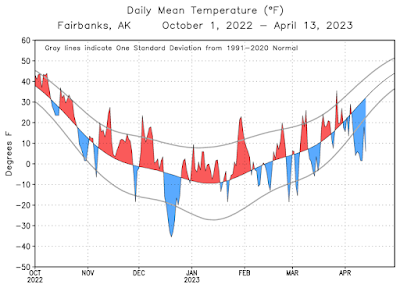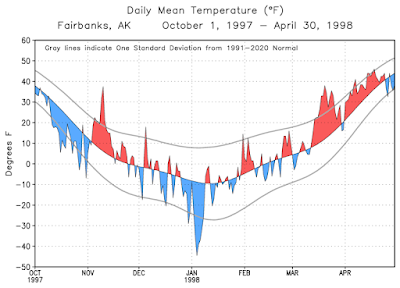While the cold snap this month has been most pronounced and unusual for western Alaska, it's been very chilly in Fairbanks too. On Monday and Tuesday of this week the daily mean temperature was only 1.5°F, which is nearly 3 standard deviations below normal - a very unusual event.
Here's an interesting statistic: the week ending yesterday in Fairbanks saw the largest departure from normal of any 7-day period in the entire winter, and that's quite remarkable given that temperature variability typically drops off a lot by April. The week ending December 22 was a close second for largest departure from normal.
However, this cold spell still pales in comparison to the 2021 cold snap, when Fairbanks had a daily mean temperature of -12°F on April 9 (41°F below normal, or nearly 4 SD below normal).
Rick Thoman penned a summary of the cold spell as of Wednesday, noting that the recurrence of severe April cold in recent years is starting to become a bit intriguing:
https://alaskaclimate.substack.com/p/april-cold-snap-in-western-alaska
Reader Gary asked about temperature variability and the lack of extremes this winter, and it certainly is true that Fairbanks has had a benign winter from the standpoint of temperature extremes (until now). In December through February, only 8 days had a daily mean temperature below -20°F or above +20°F, and looking back at the history, only 1930-31 and 2020-21 (there it is again) had fewer such days.
As for the variance of daily temperatures across the broader winter season of November through March, this winter had the 4th lowest variance on record, with 1997-98 holding the title for least variable. (Note that I'm calculating variance using daily temperature departures from normal, not absolute temperatures.) Here's the very unusual temperature trajectory from winter 1997-98, when the most powerful El Niño on record prevailed across the tropical Pacific.
Reduced temperature variance is a common feature of El Niño winters in Fairbanks, as I discussed back in 2016, during the last super El Niño:
https://ak-wx.blogspot.com/2016/02/lack-of-cold-and-low-variance.html
Here's another post, showing that El Niño tends to produce a stable flow pattern, whereas the circulation tends to jump around more than normal during La Niña.
https://ak-wx.blogspot.com/2015/09/enso-height-patterns.html
This of course means that the lack of variance this winter is particularly odd, given that it was a La Niña winter! Both cold and variance were missing until now; but perhaps they were not sorely missed.



Thanks Richard for looking at this winter's variance vs the yearly trends. Mr. and Ms. Medium were holding court in Fairbanks until April. ENSO was in transition I believe so maybe more neutral than a full steam La Nina?
ReplyDeletehttps://www.cpc.ncep.noaa.gov/products/analysis_monitoring/enso_advisory/figure06.gif
Yes, the ENSO transition got under way in March, but I'd argue La Nina was still entrenched in February - it was definitely a La Nina winter, therefore surprising to see the lack of extremes. I'm thinking the ongoing widespread and very unusual warmth in the North Pacific has a lot to do with anchoring the pattern in place - that warmth is much farther north than usual for La Nina.
DeleteStill no major melting in Fairbanks. Some insolation hitting streets and dark areas showing ice>water transition, but cold nights arrest that. Snow forecast for late weekend>next week will delay Spring yet again.
DeleteI'm ok with warm Pacific living here ......but the effects on coastal communities and ocean resources are an increasing challenge. El Nino coming may enhance that?
An El Nino conversation:
Deletehttps://theconversation.com/el-nino-is-coming-and-ocean-temps-are-already-at-record-highs-that-can-spell-disaster-for-fish-and-corals-202424
Thanks Gary, good discussion. Yes, it's coming - how strong remains to be seen, but there are signs it could be a big one.
Delete